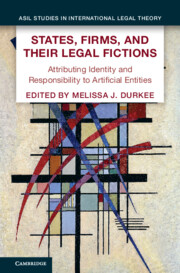 States, Firms, and Their Legal Fictions
States, Firms, and Their Legal Fictions Corporations, States, and International Law
from Part I - International Attribution
Published online by Cambridge University Press: 29 February 2024
This chapter reveals the gap between the legal assumption that corporations and governments are formally separated and the reality of deep interdependence between governments and corporations in colonial settings, analyzing how this situation provided private business corporations with the legal infrastructure they needed to leverage their position to thrive in the colonization of Africa. It then explores related doctrines of international law – —diplomatic protection, human rights, and investment protection – —as additional aspects of the the international legal infrastructure that protected corporate actors from responsibilities while granting them significant benefits as individual rights bearers. This chapter chronicles the lingering presence and influence of international law on the regulatory options available for corporations operating both within and outside state borders.
To save this book to your Kindle, first ensure no-reply@cambridge.org is added to your Approved Personal Document E-mail List under your Personal Document Settings on the Manage Your Content and Devices page of your Amazon account. Then enter the ‘name’ part of your Kindle email address below. Find out more about saving to your Kindle.
Note you can select to save to either the @free.kindle.com or @kindle.com variations. ‘@free.kindle.com’ emails are free but can only be saved to your device when it is connected to wi-fi. ‘@kindle.com’ emails can be delivered even when you are not connected to wi-fi, but note that service fees apply.
Find out more about the Kindle Personal Document Service.
To save content items to your account, please confirm that you agree to abide by our usage policies. If this is the first time you use this feature, you will be asked to authorise Cambridge Core to connect with your account. Find out more about saving content to Dropbox.
To save content items to your account, please confirm that you agree to abide by our usage policies. If this is the first time you use this feature, you will be asked to authorise Cambridge Core to connect with your account. Find out more about saving content to Google Drive.